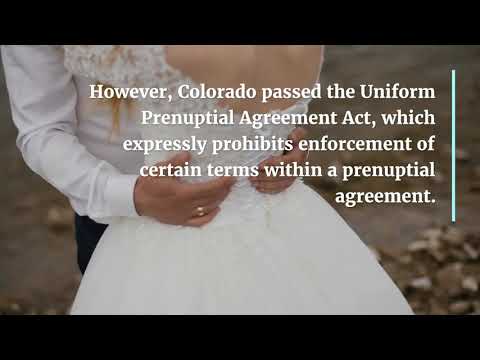
Welcome to this informative article on the role of legal representation in prenuptial agreements in Colorado. It is important to note that the information provided here should always be cross-referenced with other reliable sources or legal advisors to ensure accuracy and applicability to your specific situation. Now, let’s delve into the fascinating world of prenuptial agreements and the crucial role that legal representation plays in this process.
Navigating Prenuptial Agreements in Colorado: Understanding the Need for Legal Representation
Navigating Prenuptial Agreements in Colorado: Understanding the Need for Legal Representation
When it comes to prenuptial agreements in Colorado, it is crucial to understand the importance of legal representation. Prenuptial agreements, also known as “prenups,” are legally binding contracts entered into by couples before they get married or enter into a civil partnership. These agreements outline the division of assets and liabilities should the marriage end in divorce or separation.
📋 Content in this article
While prenuptial agreements may not be the most romantic topic to discuss before getting married, they serve an essential purpose in protecting individuals’ rights and interests. Without proper legal representation, couples may face significant challenges when navigating the complexities of drafting and enforcing a prenuptial agreement.
Here are some key reasons why engaging legal representation is crucial in the prenuptial agreement process in Colorado:
1. Understanding the Law: Prenuptial agreements in Colorado are governed by state laws, and it is vital to have a clear understanding of these laws when drafting an agreement. An experienced attorney can guide you through the legal requirements and ensure that your contract complies with all necessary provisions.
2. Customization and Tailoring: Each couple’s circumstances are unique, and a one-size-fits-all approach does not work for prenuptial agreements. Legal representation allows you to customize your agreement to fit your specific needs and requirements. Attorneys can help identify potential issues and address them adequately in the contract.
3. Disclosure Requirements: Colorado law requires full disclosure of assets, debts, and financial obligations during the prenuptial agreement process. Failing to provide accurate and complete information can jeopardize the validity of the agreement. An attorney can ensure that all necessary disclosures are made, protecting both parties’ interests.
4. Enforceability: Prenuptial agreements must meet certain criteria to be enforceable in Colorado.
Understanding the Limitations of Prenuptial Agreements: Five Key Restrictions on Inclusion
Understanding the Limitations of Prenuptial Agreements: Five Key Restrictions on Inclusion
Prenuptial agreements, also known as prenups, are legal contracts entered into by couples before they get married or enter into a civil partnership. These agreements outline how assets and debts will be divided in the event of a divorce or separation. While prenups can be a valuable tool for protecting individuals’ financial interests, it’s important to understand that there are several limitations on what can be included in these agreements. In this article, we will explore five key restrictions on the inclusion of certain provisions in prenuptial agreements in the United States.
1. Child Custody and Support
Prenuptial agreements cannot include provisions related to child custody and child support. The reason for this restriction is that child custody and support decisions are made based on the best interests of the child at the time of the divorce or separation. Courts have the final say in determining child custody and support arrangements, and they consider various factors to ensure the well-being of the child. Including provisions in a prenup that address these matters would undermine the court’s authority to make decisions in the child’s best interests.
2. Illegal Provisions
It is important to note that prenuptial agreements cannot include provisions that are illegal or against public policy. For example, agreements that encourage illegal activities, waive the right to child support, or promote fraud would be unenforceable. It is essential to consult with a qualified attorney who can ensure that the provisions in your prenup comply with the law and are not in violation of public policy.
3. Unconscionable Provisions
Courts will not enforce prenuptial agreements that contain unconscionable provisions. An unconscionable provision is one that is so one-sided and unfair that it shocks the conscience.
Title: Understanding the Role of Legal Representation in Prenuptial Agreements in Colorado
Introduction:
Prenuptial agreements, also known as “prenups,” have become increasingly common in today’s society. These legal contracts, entered into before marriage, outline the rights and responsibilities of each party in the event of a divorce or separation. While prenuptial agreements are not required by law, they can provide couples with financial security and peace of mind.
Importance of Staying Current on Prenuptial Agreement Laws:
It is crucial for anyone considering a prenuptial agreement in Colorado to stay informed about the current laws surrounding these contracts. Laws regarding prenups can vary from state to state, including specific requirements, provisions, and enforceability. Colorado, like other states, has its own set of laws governing prenuptial agreements, and it is important to understand these laws before entering into such an agreement.
Key Points to Consider for Prenuptial Agreements in Colorado:
1. Voluntary Agreement: In Colorado, a prenuptial agreement must be entered into voluntarily by both parties. Neither party should feel coerced or pressured into signing the agreement. It is crucial that both individuals have a clear understanding of the terms and implications of the agreement.
2. Full Disclosure: Full and fair disclosure of assets, debts, income, and financial obligations is required when creating a prenuptial agreement in Colorado. This includes providing accurate and comprehensive information about each party’s financial situation. Failure to disclose all relevant information may render the agreement unenforceable.
3. No Unconscionability: A prenuptial agreement must not be unconscionable at the time of its execution. This means that the terms of the agreement should not be so one-sided or unfair that they shock the conscience of the court. If a court finds an agreement to be unconscionable, it may refuse to enforce it.
4.
